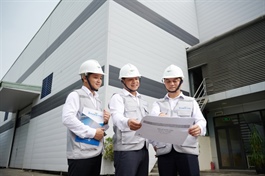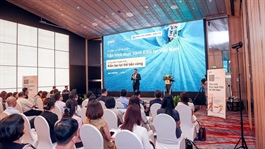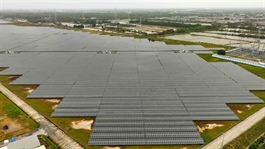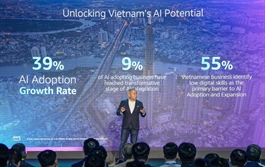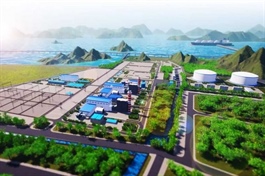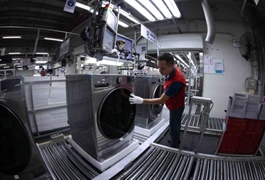ESG: the new passport for manufacturers
ESG: the new passport for manufacturers
Vietnam’s manufacturing sector is now facing a defining challenge: sustainability is no longer optional. Vlad Savin, partner at Acclime Vietnam, analyses the mandatory standards for businesses that aim to thrive in an increasingly competitive global landscape.
Globally, environmental, social, and governance (ESG) criteria has shifted from being a voluntary initiative to becoming a core business requirement. Stricter international measures such as the EU’s Carbon Border Adjustment Mechanism, the Corporate Sustainability Reporting Directive, and US supply chain due diligence laws are reshaping market expectations. Buyers and investors now demand transparency, responsible sourcing, and credible carbon management from their partners.
Vietnam has recognised this shift and is moving to align its manufacturing sector with global sustainability standards. A prime example is the development of eco-industrial parks (eco-IPs), which reflect the country’s commitment to ESG and the circular economy. Since 2014, Vietnam and international partners have been piloting and expanding the eco-IP model.
While momentum is strong, ESG adoption is still at an earlier stage compared to regional peers such as Singapore and Malaysia, which already have mature regulatory frameworks and established reporting practices. Within Vietnam, large enterprises and foreign-invested companies tend to lead ESG adoption, often transferring established practices from their global headquarters. By contrast, small and medium-sized enterprises face greater barriers due to limited resources, knowledge gaps, and difficulties in integrating sustainability strategies systematically.
ESG compliance has become a ticket to participate in global supply chains. Multinational corporations are no longer satisfied with low-cost production alone; they now demand that suppliers meet stringent sustainability benchmarks. Industry giants like Heineken have already embedded ESG into their Vietnam operations, they have continuously upgraded technology to reduce carbon emissions, expand the scale of solar power systems, and purchase agricultural waste from farmers to operate the thermal energy system for the brewery.
Lego’s recent $1 billion carbon-neutral plant in Binh Duong, powered entirely by solar energy, is a striking example of the new standard investors and brands expect. This facility not only showcases Vietnam’s potential as a hub for sustainable manufacturing but also signals a clear message: companies that fail to align with ESG principles may soon find themselves excluded from lucrative contracts and export opportunities. For Vietnam’s export-driven economy, the ability to integrate ESG is directly tied to maintaining and expanding market access.
Capital markets are rapidly shifting towards sustainability-driven investment strategies. Investors increasingly view ESG performance as a proxy for resilience, risk management, and long-term profitability.
In Vietnam, this trend is being reinforced by policy. Changes introduced in 2023 offer preferential credit terms to businesses that adopt ESG-aligned practices, particularly those advancing green growth and circular economy models. For manufacturers, this means that early and credible ESG adoption does not just improve reputation, it also unlocks access to cheaper capital, priority financing, and a stronger position in the eyes of both domestic and international investors.

ESG: the new passport for manufacturers |
Gateway to markets and talent
Beyond access to markets and capital, ESG integration delivers direct operational benefits. Sustainable practices often go hand in hand with efficiency gains, reducing waste, optimising resource use, and cutting costs.
The value of ESG integration also extends to human capital. A new generation of workers, particularly younger, educated employees, are increasingly drawn to companies that demonstrate a commitment to sustainability, social responsibility, and ethical business practices. In Vietnam, where the manufacturing sector faces both skills shortages and growing competition for talent, embedding ESG principles strengthens employer branding.
Companies that provide safe working conditions, invest in employee development, and contribute positively to society are better positioned to attract and retain skilled labour. This is not only a matter of corporate image, but it also directly impacts productivity, innovation, and the ability to compete in an increasingly knowledge-driven industrial landscape.
While discussions on ESG in Vietnam often emphasise environmental priorities such as carbon reduction, renewable energy, and resource efficiency, the social and governance dimensions are just as critical for shaping the future of manufacturing. On the social side, workers continue to face challenges including occupational health and safety risks, excessive overtime, and job insecurity linked to the widespread use of short-term contracts.
In manufacturing hubs like Binh Duong, large numbers of migrant workers add further complexity to social inclusion efforts. Manufacturers must strengthen labour protections and invest in upskilling programmes that prepare employees to operate advanced machinery, analyse data, and adapt to new production models. Building a resilient, tech-savvy workforce not only enhances productivity but also positions Vietnam to move up the global value chain, shifting from low-cost assembly to more innovation-driven manufacturing.
At the same time, workplace safety, gender equality, and fair wages are becoming non-negotiable in global supply chains. International buyers, particularly in the EU and US, are enforcing stricter due diligence on labour practices, meaning that non-compliance can result in reputational damage and the loss of crucial export opportunities.
Equally important is the governance dimension of ESG. Over the past five years, Vietnam has taken significant steps to formalise corporate responsibility and transparency, particularly among listed firms.
Key regulations include the 2019 Law on Securities and Decree No.155/2020/ND-CP, which establishes requirements for corporate governance and information disclosure. A 2020 circular further specifies what public companies, bond issuers, and fund managers must report, including material ESG risks. These reforms reflect a broader shift towards accountability and align Vietnam more closely with international standards.
For manufacturers, staying updated on evolving regulatory requirements is essential, not only to remain compliant but also to build trust with investors, business partners, and consumers in an increasingly sustainability-conscious market.
Compliance to competitiveness
Vietnamese manufacturers are beginning to integrate ESG principles into their operations through both technology adoption and process transformation, though progress remains uneven.
A key priority has been the deployment of carbon tracking and management technologies, driven largely by compliance requirements.
Locally, regulations on greenhouse gas inventories mandate reporting and emissions monitoring, while internationally, the EU’s aforementioned carbon mechanism has raised the stakes for exporters.
To meet these demands, manufacturers are focusing on two areas: carbon monitoring systems that enable decarbonisation strategies, and automated data collection platforms that streamline compliance reporting. These tools are increasingly supported by digital solutions such as blockchain and IoT, which improve transparency, traceability, and accuracy across supply chains.
In parallel, many firms are embracing circularity initiatives to reduce environmental impact while improving efficiency. These efforts include optimising resource use, improving waste and water management, and adopting symbiotic approaches within eco-IPs, where companies share resources and by-products to minimise waste.
Such initiatives not only help companies meet ESG benchmarks but also create tangible cost savings and competitive advantages. Despite strong interest, implementation remains relatively slow, particularly among smaller businesses, which often lack the resources and expertise to scale these initiatives effectively.
Looking ahead, Vietnam’s regulatory reforms and international trade commitments are increasingly aligned with global ESG priorities. Policies such as the Green Growth Strategy, strategies on eco-IPs, and the country’s pledge to achieve net-zero by 2050 provide a clear policy framework for manufacturers to follow.
Companies that align with these priorities and engage in partnerships with government agencies, non-governmental organisations, and academic institutions stand to benefit from preferential incentives, reduced compliance risks, and co-developed solutions that strengthen long-term profitability.
For Vietnam’s manufacturing sector, ESG integration is not simply about meeting external requirements, it is becoming a strategic pathway to secure market access, attract investment, and position the country as a leader in sustainable industrial growth.
Vietnam’s manufacturing industry is at a crossroads, where integrating ESG principles is indispensable for sustainable growth and global competitiveness. Addressing social challenges such as gender inequality, workforce skills gaps, and labour protections, while aligning with evolving regulations, will build a more resilient and inclusive sector.
Success will depend on collaborative efforts among government, private sector, and civil society to unlock the full potential of ESG, ensuring that Vietnam’s manufacturing continues to thrive responsibly in the global economy.
- 11:27 24/09/2025







